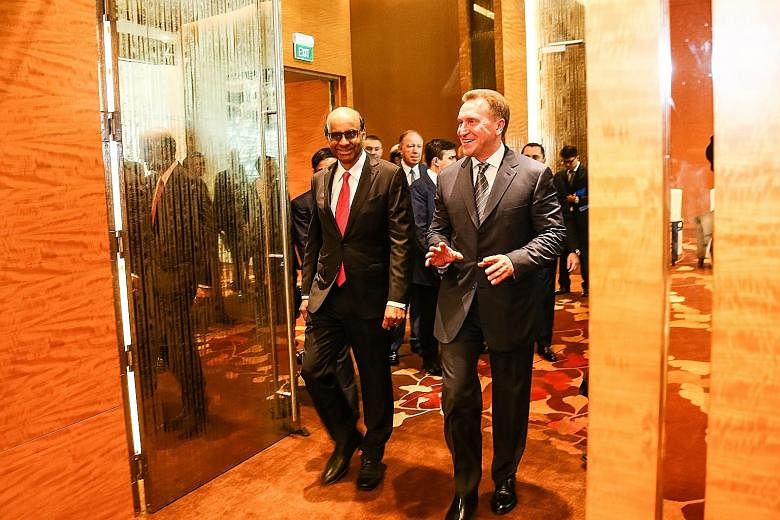There is "still a lot of work to do" when it comes to innovation as Singapore gears up for its next phase of economic development, said Deputy Prime Minister Tharman Shanmugaratnam yesterday.
"We can't be too satisfied about what we've achieved, we still have a lot of work to do in Singapore," he said, speaking at the Russia-Singapore Business Forum.
A key area that needs improvement involves the connection between research in universities and other institutions and commercialisation and enterprise, said Mr Tharman. "We've built up a strong base of R&D (research and development), particularly in the science and technology fields, and we have a lot of enterprise, but the connection between the two is not as strong as it should be."
Mr Tharman, who is also Coordinating Minister for Economic and Social Policies, noted that while Singapore tends to do well in conventional rankings of global universities, such rankings are typically based only on research publications.
"Publishing something in the most advanced journal doesn't change the world, doesn't add to value, doesn't add to incomes. What changes the world is converting research to something that is available in the market, pleases customers and improves the quality of life," he said.
"So the commercialisation of research and focusing on moving upstream to downstream has to be our priority." Doing so will require incentives for researchers, strong technology incubators, as well as a new generation of start-ups - made up of individuals who are knowledgeable, with perhaps deep technology expertise, and those who "really want to make a lot of money out of it", he said.
Mr Tharman added: "If we want to provide that empowerment to our (businesses), integrating R&D with start-ups and entrepreneurs and focusing on that intermediate layer of curating this innovation... will be a very important strategy for Singapore's future."
He also said the uncertainty across the world means Singapore has to work even more on developing strengths that are more relevant to the rest of the world.
In doing so, there are opportunities for mutual collaboration between Singapore and Russia, he noted, adding that the Eurasian Economic Union (EAEU) also offers significant economic prospects in today's uncertain world.
The forum at Marina Bay Sands Expo and Convention Centre featured Mr Tharman and Mr Igor Shuvalov, First Deputy Prime Minister of the Russian Federation, discussing the global environment, economic priorities in Russia and Singapore and opportunities for collaboration.
Organised by International Enterprise Singapore, the event drew more than 200 Russian and Singapore business representatives.
It was held in conjunction with the seventh session of the High-Level Russia-Singapore Inter-Governmental Commission (IGC), a high-level dialogue co-chaired by the two deputy prime ministers and aimed at strengthening broad-based cooperation between Russia and Singapore.
At the IGC, the deputy prime ministers reaffirmed their strong commitment to the free trade agreement under negotiation between Singapore and the EAEU. The EAEU represents a combined market of 180 million people and a total gross domestic product of US$4.4 trillion (S$6.3 trillion) in purchasing power parity terms.
Both also welcomed the steady growth of both trade and Singapore investments in Russia, including an agreement that was signed yesterday between Changi Airports International (CAI) and Basic Element and the Russian Fund for Direct Investments. Under the deal, CAI and its Russian partners will invest in, manage and operate Vladivostok Knevichi Airport.
Singapore and Russia also agreed to explore collaboration in areas such as supporting technology-focused incubators and start-ups, among others.


